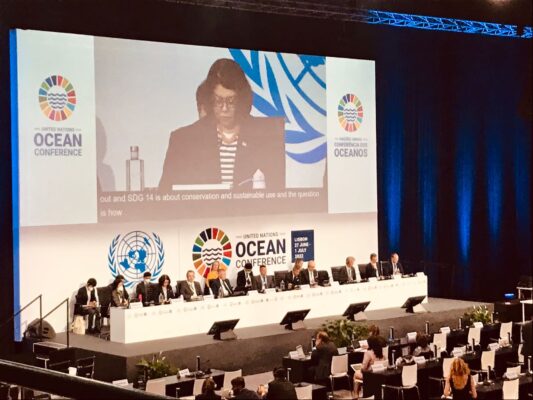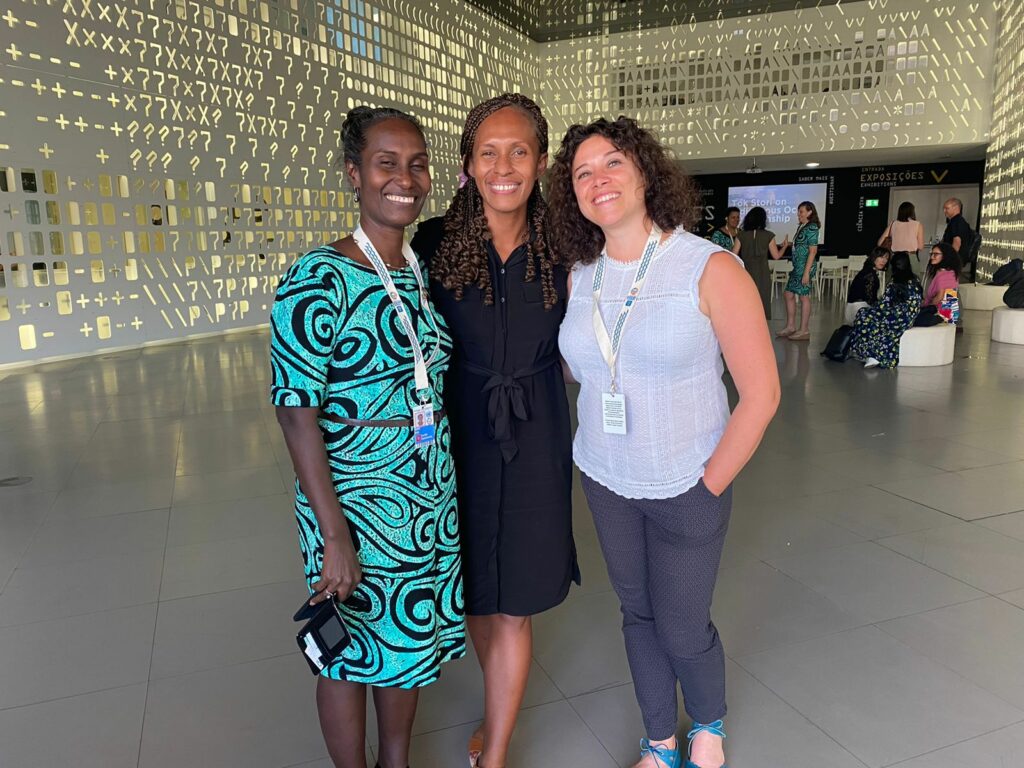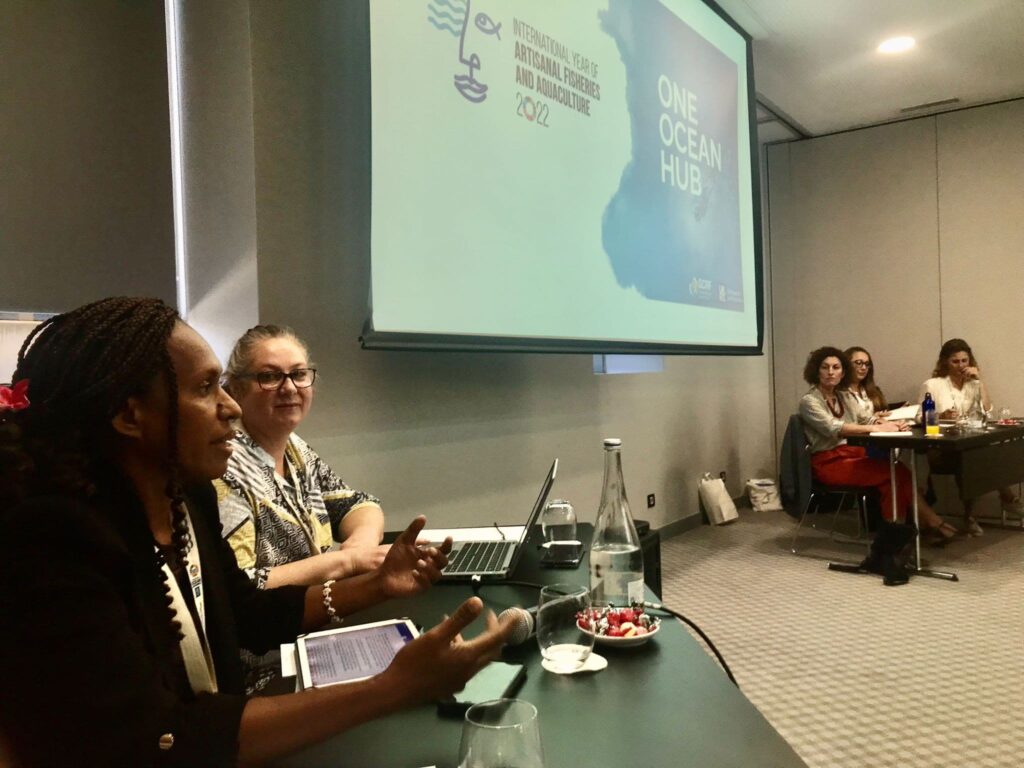Reflecting on the UN Ocean Conference and the need to scale up ocean action for the transformative ocean governance we ALL need

The second UN Ocean Conference brought together the international community of ocean decision-makers, researchers, practitioners and stakeholders to reflect on the need to scale up ocean action. While some insights have been captured in the official outcome of the Conference (the political declaration agreed upon by State representatives), critical directions for the transformative change have emerged from the exchanges among civil society, youth representatives, researchers and UN partners on the side-lines of the Conference. This blog post reflects on the kind of innovative action that has been called for by governments at the 2022 UN Ocean Conference, assessing progress vis-à-vis the first UN Ocean Conference in 2017, and offers views on what else is necessary for innovative ocean action to be transformative and benefit us all.
Scaling ocean action – as climate action?
The UN Ocean Conference (Lisbon, Portugal, 27 June- 1 July 2022) was convened under the theme “Scaling up ocean action based on science and innovation for the implementation of Goal 14: stocktaking, partnerships and solutions.” In addition to expressing alarm for the effects of climate change on the ocean as in 2017 (rise in ocean temperatures, ocean acidification, deoxygenation, sea level rise, the decrease in polar ice coverage, coastal erosion and extreme weather events), the 2022 Declaration also emphasized “shifts in the abundance and distribution of marine species, including fish”, the “decrease in marine biodiversity” and “related impacts on island and coastal communities”. On the one hand, these additional references bode well for more “integrated ocean management, planning and decision-making, through improving our understanding of the impact of cumulative human activities on the ocean and anticipating the impacts of planned activities and eliminating or minimizing their negative effects, as well as the effectiveness of adopted measures.” Surprisingly, however, there were no detailed calls about scaling up ocean action under the Paris Agreement and the Glasgow Climate Pact, particularly with regard to climate finance, which may be considered a priority in connecting the climate and ocean regimes for integrated and transformative action (as the One Ocean Hub called for also as the Bonn climate conference in May 2022).
On the other hand, the climate-related references in the Political Declaration do not sufficiently underscore the equity issues at stake, despite the additional reference to “avert[ing], minimiz[ing] and address[ing] loss and damage, and implementing nature-based solutions, ecosystem-based approaches for… carbon sequestration and the prevention of coastal erosion.” It is noteworthy, in this connection, that the recently appointed UN Special Rapporteur on Climate Change and Human Rights attended the UN Ocean Conference, and is in the process of preparing a report on loss and damage. The One Ocean Hub made a submission to contribute to that report, in order to underscore the loss and damage arising from climate change impacts on marine ecosystems, and the transformative potential of ocean-based climate action that contributes to biodiversity conservation and human rights protection.

An “ambitious” BBNJ agreement
The 2022 Political Declaration also calls for “an ambitious agreement without delay” on marine biodiversity of areas beyond national jurisdiction (BBNJ), which has been under discussion at the UN for decades. There were certainly various national delegations expressing commitment towards a speedy conclusion of current negotiations, but not much detail about what an ambitious agreement may look like. That said, there are several recommended actions in the Political Declaration that would benefit from specific backing in a future BBNJ agreement, notably: strengthening the “science-based and innovative actions on an urgent basis”, “standardizing data, ensuring interoperability between databases” and “enhance[ing] cooperation at the global, regional, subregional, national and local levels in order to strengthen mechanisms for collaboration, knowledge-sharing and exchange of best practices within marine scientific research.”
More generally, the BBNJ agreement could set a more realistic and equitable path towards “science-based and innovative actions and international cooperation and partnerships based in science, technology and innovation, in line with the precautionary approach and ecosystem-based approaches” that takes into account the current barriers to deep-sea science for the Global South, as well as the need for public participation and consideration of the crucial importance of deep-sea ecosystems for everyone’s human rights (including the international human right to a healthy environment, recognized by the UN General Assembly in August 2022; for an earlier reflection from a marine perspective, see here).
To connect these points and build on the insights of marine, social and legal researchers, the One Ocean Hub produced three policy briefs for the fifth session of the Intergovernmental Conference (IGC-5) negotiating the BBNJ treaty, which met in late August 2022, show how a truly ambitious BBNJ agreement needs to support ocean knowledge co-development for transformative ocean governance. As IGC-5 did not complete the negotiations of the new treaty, there is still an opportunity for the research community to continue working with delegations and stakeholders in this direction. Contrary to how international media have portrayed this situation, the need for continued negotiations on BBNJ is not a “failure”, but rather a precious and much-needed opportunity to raise the bar higher in terms of the content and coherence of the treaty to create the conditions to make a difference in ocean governance both from the viewpoint of environmental sustainability and equity, while keeping within a tight timeframe (potentially January 2023).
Small-scale fishers’ contributions and rights
In 2017, the first UN Ocean Conference paid scant attention to small-scale fishers, although it did underscore the need to “strengthen capacity-building and technical assistance provided to small-scale and artisanal fishers in developing countries, to enable and enhance their access to marine resources and markets and improve the socioeconomic situation of fishers and fish workers within the context of sustainable fisheries management.” Things changed significantly in 2022, with a strong presence of small-scale fishers’ representatives and their partners, as part of the celebrations and action around the International Year of Artisanal Fisheries.
The 2022 Political Declaration thus calls for “collaborative processes for decision-making that include … small-scale and artisanal fisheries, recognizing their role in poverty eradication and ending food insecurity.” This reference to the local and global contributions of small-scale fishers are particularly timely with growing international recognition of their role as ocean human rights defenders. This in turn helps recognize small-scale fishers’ contribution to the protection of everyone’s human right to a healthy environment, as emphasized by the UN High Commissioner for Human Rights and the UN Special Rapporteur on the Environment and Human Rights during this year’s World Ocean Week.
What was mentioned several times, in official parts of the Conference, as well as on the sidelines, was the continued need to protect the human rights of small-scale fishers, as an integral part of the efforts to implement SDG 14. The references to human rights were another remarkable difference compared to the 2017 UN Ocean Conference. That said, more work remains to be done to understand the benefits of more coherent human rights protection for sustainable fisheries and a healthy ocean, as the One Ocean Hub is exploring with FAO, the UN Office of the High Commissioner for Human Rights, the Danish Institute for Human Rights, WWF and others.
In particular, more attention is needed to the inter-play of cultural and participation rights of small-scale fishers as part of the transformative ocean governance. The 2017 Conference had already called for “develop[ing] comprehensive strategies to raise awareness of the natural and cultural significance of the ocean”, but this remains a task to be progressed – including under the UN Decade for Ocean Science and the BBNJ agreement. The coherent protection of small-scale fishers’ human rights is also crucial for “the conservation and sustainable use of the ocean … in ensuring a sustainable, inclusive and environmentally resilient recovery from the COVID-19 pandemic,” which is also called for in the Political Declaration. The One Ocean Hub have documented the impact of the pandemic on small-scale fishers (see here and here).

Policy coherence – plastics, fisheries subsidies and beyond
While the 2017 UN Ocean Conference paid particular attention to the need for policy coherence (SDG 17.14) as a pre-condition for transformative change, no references to this concept or to the indivisibility of the SDGs can be found in the 2022 Political Declaration. That is all the more surprising as some key policy areas have mase progress in this connection, as demonstrated by the launch of a new treaty process on the whole cycle of plastics, which shows the need to tackle the problem of ocean plastics not as an isolated and purely marine issue, but through the lenses of systems thinking. It is also the case of the new agreement under the World Trade Organization on fisheries subsidies. These developments were mentioned several times in Lisbon, but no references can be found in this connection in the Political Declaration. One of the missed opportunities here is to connect more closely the work needed to reduce plastic production, as a way to prevent ocean plastics at source and to advance climate change mitigation by tackling fossil fuel production.
Another missed opportunity for more joined-up approaches was a request for synergies between the UN Decade for Ecosystem Restoration and UN Decade for Ocean Science, which are mentioned in separate and unrelated paragraphs of the 2022 Political Declaration for the mere purposes of recognizing their respective importance. As discussed at the Glasgow Climate COP, there is instead a great need to advance ocean science for ecosystem restoration, and to share findings and approaches that maximize benefits for climate change mitigation and adaptation, and for the protection of various human rights dependent on healthy marine ecosystems.
Whose values and knowledge for ocean governance? Indigenous peoples, women and youth
The 2022 Political Declaration is notable for referring to the need for “assessing … multiple ecological, socioeconomic and cultural values” as part of effectively planning and implementing area-based management tools, including marine protected areas, other effective area-based conservation measures and marine spatial planning. It also stresses the “important role of indigenous, traditional and local knowledge, innovation and practices of indigenous peoples and local communities, as well as the role of social sciences in planning, decision-making and implementation” and informing policy “with the best-available science and relevant indigenous, traditional and local knowledge.” It was difficult, however, to see how indigenous and local knowledge influenced the Conference, or how much importance was recognized to it in the context of any of the other international processes mentioned in the Political Declaration. The One Ocean Hub underscored, throughout the Conference, the need more innovative approaches to respectfully connect with and learn from indigenous and local knowledge (see the Hub’s art-based approaches here, here and here), with particular attention to women (see also here and here). More generally, ocean cultural heritage remains little understood as part of integrated and inclusive ocean governance (see Hub resources here, here, here, here and here).
The Political Declaration further contains commitments to empower women and girls in progressing towards a sustainable ocean-based economy and to achieving SDG 14, as well as children and youth to “understand the importance of and the need to contribute to the health of the ocean, including in decision-making, through promoting and supporting quality education and lifelong learning for ocean literacy.” Youth representatives in Lisbon made the most articulated statements on the ocean-climate nexus, on the BBNJ negotiations and the need to rethink deep-seabed mining (see also here). On the latter, the political momentum gained around a moratorium on deep-seabed mining has been considered one of the main achievements at the Conference. Despite this, youth representatives felt marginalized from the main political discussions taking place in Lisbon. It is for this reason that the One Ocean Hub has been contributing to the development of a new UN General Comment on children’s human rights and the environment, with a view to providing more clarity on the international human rights obligations of States to ensure meaningful participation of youth in ocean decisions-making, as well as to effectively listen to youth’s voices at different scales of ocean governance.
What innovative partnerships we ALL need?
While the 2022 Political Declaration contains a commitment to “transformative change” with a view to “halting and reversing the decline in the health of the ocean’s ecosystems and biodiversity and to protecting and restoring its resilience and ecological integrity,” it does not provide in and of itself the joined-up approaches or clarify the innovative elements of partnerships that can help deliver transformation. The Declaration rather underscores the need to capture “policies and actions that may be scalable, through processes such as the Regular Process for Global Reporting and Assessment of the State of the Marine Environment, including Socioeconomic Aspects,” as a way forward.
The One Ocean Hub and its partners have provided their most recent insights on these critical questions in and around the UN Ocean Conference. We shared the message that ouranalysis (Niner et al, 2022) indicates that national blue economy policies focus on technical solutions that do not address systemic issues, such as discrimination, gender equality, and challenges posed by climate change (SDGs 16C, 5 and 13). We thus identified four challenges to strengthening sustainable ocean-based economies:
- avoid reproducing historical and current injustices, by identifying and addressing contextual inequalities;
- avoid exclusionary and non-responsive processes (SDG 16.7), by paying attention to local, national and global power imbalances that limit people’s abilities to engage in policy development;
- avoid prejudice against local knowledge systems, by integrating intangible cultural heritage (SDG 11.4) and respecting cultural rights;
- Accurately valuing blue natural capital, by integrating crucial marine ecosystem services (including deep-sea ecosystem services) on which humanity depends (notably, climate regulation and climate change mitigation, and contributions to human health).
We then shared what we have learnt so far in developing fair and innovative partnerships between researchers, civil society, communities and authorities that are based on:
- A human rights-based approach (to integrate evidence base & clarify minimum standards of conduct)
- A valuation of deep-sea ecosystem services (notably climate change, human health)
- Historical analysis of injustices, dispossession and discrimination (identification of relevant human right-holders) and
- Art-based approaches (more equitable spaces for public dialogue and conflict transformation).
We have exchanged with stakeholders and decision-makers our interim findings on how inclusive ocean knowledge co-production is a necessary precondition for the development of fair and sustainable blue economies, effective ocean-based solutions to climate change, and the implementation of multiple Sustainable Development Goals. This requires relying on the latest understanding of deep-sea ecosystems, and their benefits to humanity, the role of ocean culture and the arts in providing a space for transformative dialogue, and the benefits of mainstreaming human rights (of indigenous peoples, small-scale fishers, women and children, as well as everyone’s human right to a healthy environment) for integrated ocean science, management and governance. We will continue to distil key learning and approaches from our work, connect it in innovative ways with other’s efforts, and work with partners in preparation for the next UN Climate and Biodiversity COPs and the continuation of the International Year of Artisanal Fisheries and Aquaculture.